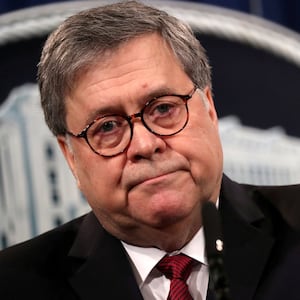If you come at the king, you best not miss.
That’s the message Attorney General William Barr is sending to FBI agents, whether intentionally or not. Barr has authorized yet another investigation into the FBI’s conduct probing links between Russian election interference and the Trump campaign. Even though two other entities are already investigating the same matter, reports indicate that Barr has appointed Connecticut U.S. Attorney John Durham to investigate the origins of the Russia probe.
In doing so, Barr is playing into the hands of President Donald Trump, who has already characterized Durham’s assignment as an investigation into “how that whole hoax got started.”
The most charitable interpretation of Barr’s behavior in defense of Trump is that he believes strongly in a “unitary executive,” where the president can order any investigation he wants. But in his quest to protect the presidency, Barr is damaging our national security. His complicity in Trump’s efforts to disparage the FBI will make it more difficult for agents to do their jobs and could discourage investigations of those in power.
Certainly, the FBI, like any other government agency, should be subject to scrutiny. If you were to ask most FBI agents about internal investigations, they would tell you that they welcome such probes when done in good faith because they ensure not only accountability but also public trust.
Following the FBI’s aggressive surveillance of civil rights activists and war protesters in the 1960s and ’70s, safeguards and approval requirements were created to prevent such abuses. The Foreign Intelligence Surveillance Court was created to provide independent oversight of wiretaps conducted in the name of national security. The Domestic Investigations Operations Guide was created to provide detailed operational and approval requirements for each investigative step. FBI personnel are subject to DOJ’s Office of Professional Responsibility, which investigates allegations of misconduct. The FBI also has its own inspection division to conduct routine audits of compliance with polices and practices.
But the current outcry about the use of FISA surveillance and informants to investigate Russian interference in the 2016 election is not sufficient predication for a criminal investigation. Those techniques are routinely and appropriately used in counterintelligence investigations against foreign adversaries. Former FBI general counsel James Baker has been speaking out about the FBI’s work on the Russia investigation, stating that the investigation was not a “coup” against President Trump, but instead was “about Russia. It was always about Russia. Full stop.” Failing to investigate Russian interference would have been a breach of the FBI’s duty.
Even use of the so-called Steele dossier in the FISA application for surveillance of Trump campaign adviser Carter Page is not the scandal that some describe. The dossier, compiled by a former British intelligence agent to be used as opposition research by Hillary Clinton’s campaign against Trump, was properly described as such in the FISA application, such that the FISA court had complete and accurate information when it authorized the surveillance. Judges, including those on the FISA court, are capable of discounting information based on potential biases as long as they are disclosed in the application, as they were here.
In addition, material from the Steele dossier provided only a portion of the facts included in the 66-page application that was used to establish probable cause to obtain surveillance authorization from the FISA court. Renewals of the application were approved from Trump-appointed Deputy Attorney General Rod Rosenstein. There is no evidence in the public record that the FBI abused the FISA process in this investigation.
Nonetheless, last year, then-Attorney General Jeff Sessions asked DOJ Inspector General Michael Horowitz to investigate potential abuses in the FISA process following complaints by Republican lawmakers. Sessions later asked Utah U.S. Attorney John Huber to pursue any criminal conduct relating to the same matter, along with other matters relating to Clinton.
It is unclear why Barr does not simply await those results rather than appoint a new prosecutor to undertake another investigation. If Barr had wanted to expand the scope of the prior investigations, he could have done so without appointing a new investigator. If he were simply replacing Huber with Durham, who, by all accounts is a highly respected and experienced investigator, then he should say so.
Instead, Barr has created the appearance that he is launching another investigation to appease Trump. But there is a significant downside to such a tactic. Barr’s appointment of Durham advances the Trump narrative that the FBI is run by a “deep state” that is engaged in a witch hunt and a hoax.
Barr has already contributed to the partisan conspiracy theory with the language he used at his press conference to announce the release of Special Counsel Robert Mueller’s report in April. Barr repeatedly used Trump’s talking point of “no collusion,” a term Mueller specifically said he was avoiding. Barr made things worse in his subsequent congressional testimony, when he used the word “spying” to describe the FBI’s tactics in the Russia probe. Despite his protestations that the word is not a pejorative term, and that “spying” is a word used by the media, it is not a word that government officials use to describe court-authorized surveillance.
Contrast Barr’s performances with the recent congressional testimony of FBI Director Christopher Wray. Wray rejected Barr’s use of the term “spying” as “not the term I would use.” Wray also stated that he did not have any evidence of any illegal surveillance into the Trump campaign. Trump responded by tweeting: “The FBI has no leadership . . . The Director is protecting the same gang . . . that tried to . . . overthrow the President through an illegal coup.”
Even after seeing this treatment, Barr continues to appease Trump, who campaigns on the narrative that he is victim of the deep state. Trump has called the FBI “a disgrace” that is “in tatters.” Harming the reputation of the FBI will make it more difficult for the FBI do the important work it does every day. When an agent knocks on a door for tips in a kidnaping case, will the resident help someone from an agency the president has warned him about? When an FBI agent testifies at the trial of a sex trafficker, will a juror trust that he is telling the truth? By disparaging the FBI, the president makes our country less safe. Barr is compounding the problem by contributing to this false narrative.
In addition to harming the effectiveness of the FBI, Barr’s complicity in Trump’s tactics may also have a chilling effect. By advancing the “investigate the investigators” mantra, Barr may cause the FBI to flinch next time it perceives a threat from powerful people within the government. He is incentivizing the FBI to sit idly by in the face of national security threats. The risk is that under Barr’s leadership, the FBI’s new motto might become “he who does nothing does nothing wrong.”







